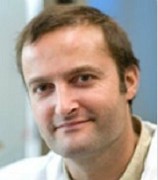Profile of Prof Matthias Marti
Questions: A small proportion of asexually replicating cells switch to a non-replicative sexual cycle that culminates in the formation of transmission-competent mature gametocyte stages. These sexual cells are genetically identical but undergo significant morphological differentiation during development while sequestered in tissues. Specific questions my lab is focusing on: i) what are the triggers and mechanisms underlying the switch from asexual replication to sexual development? ii) What are the mechanisms of tissue homing and sequestration of sexual parasite stages? What makes a parasite infectious to mosquitoes? We have been developing a series of genetic, molecular and diagnostic tools in the last years to systematically investigate these questions under controlled in vitroconditions, and during human infection. In the following paragraphs specific research projects are described in more detail.
Current Research Projects
A sign of sexual commitment: understanding mechanisms of stage conversion
In malaria parasites stage conversion is induced in late asexually replicating red blood cell stage parasites, whereby one parasite either produces only asexually or sexually committed invasive daughter parasites. After invasion of sexual parasites into red blood cells, additional factors determine progression toward transmission competent forms. Conceptually, stage conversion is probably analogous to antigenic switching: both appear to have a baseline switch rate that is regulated by epigenetic determinants, while environmental stimuli (either in the blood circulation or in the medium) are transduced into the parasites to modulate (i.e., increase or decrease) the switch rate. Indeed studies on culture-adapted parasite lines have identified specific chromosomal loci and, more recently, an epigenetic master switch required for the baseline switch rate. We first aim to test the hypothesis that specific parasite factors released into conditioned medium can regulate transmission stage formation within the population. Second we aim to identify the key pathways involved in stage conversion and the early steps of gametocyte differentiation. In a third step we will functionally analyze components of these pathways in order to gain mechanistic understanding of the process, both to close one of the key knowledge gaps in the malaria cycle and as the basis for interventions targeting malaria transmission.
Host cell modifications and tissue sequestration of P. falciparum transmission stages
Only mature gametocytes are detectable in the blood circulation, except after some drug treatments, suggesting that the developing forms sequester in deep tissues. So far it is not known where gametocytes sequester, and whether sequestration is merely the result of mechanical entrapment or of active adherence mechanisms. The capability to sequester is of fundamental importance for asexual stage parasites to avoid clearance of the infected and highly rigid red blood cells during splenic passage. Asexual stage sequestration is a major cause of severe pathogenesis in falciparum malaria, particularly by occluding vessels in the brain in cerebral malaria. Consequently mechanisms of tissue-specific sequestration have been studied in great detail in asexual stage parasites and have led to the discovery of fascinating molecular processes of host cell manipulation and subversion by the parasite.
We aim to determine whether gametocyte sequestration sites and underlying mechanisms are identical or similar to those in asexual stages, or whether gametocytes have adopted a unique niche site of enrichment using as yet unknown mechanism of homing and sequestration. Our goal is to define sequestration sites in infected humans, and in parallel investigate mechanisms of sequestration in an in vitro model.
Development of tools for malaria elimination and eradication
The critical public health intervention in any infectious disease is to interrupt transmission. Plasmodium falciparum causes the most severe form of malaria with nearly 1 million deaths every year. Morbidity and mortality of the disease can be attributed to the asexual parasite stages residing and replicating every 48 hours within red blood cells. There is no natural protective immunity or effective vaccine against this stage, and drug resistance is widespread. New interventions for disease control are therefore imperative. A subset of red blood cell stages differentiates into male and female parasites, termed gametocytes, which undergo fertilization after transmission to a mosquito vector. Differentiation and development of transmission stages are therefore critical aspects of malaria biology and an important target for intervention strategies that aim at interrupting the cycle. Indeed, revived efforts for malaria elimination and eventual eradication have expanded the focus from controlling the disease of the most virulent species, P. falciparum, to interrupting transmission and targeting other species with high associated morbidity (mainly P. vivax). However, significant knowledge gaps remain in our understanding of transmission stage biology. Novel approaches are required to fill these important knowledge gaps. My lab is aiming to address these knowledge gaps, with particular focus on understanding the mechanisms of cellular differentiation, as well as gametocyte development and tissue sequestration in preparation to successful P. falciparum parasite transmission.


